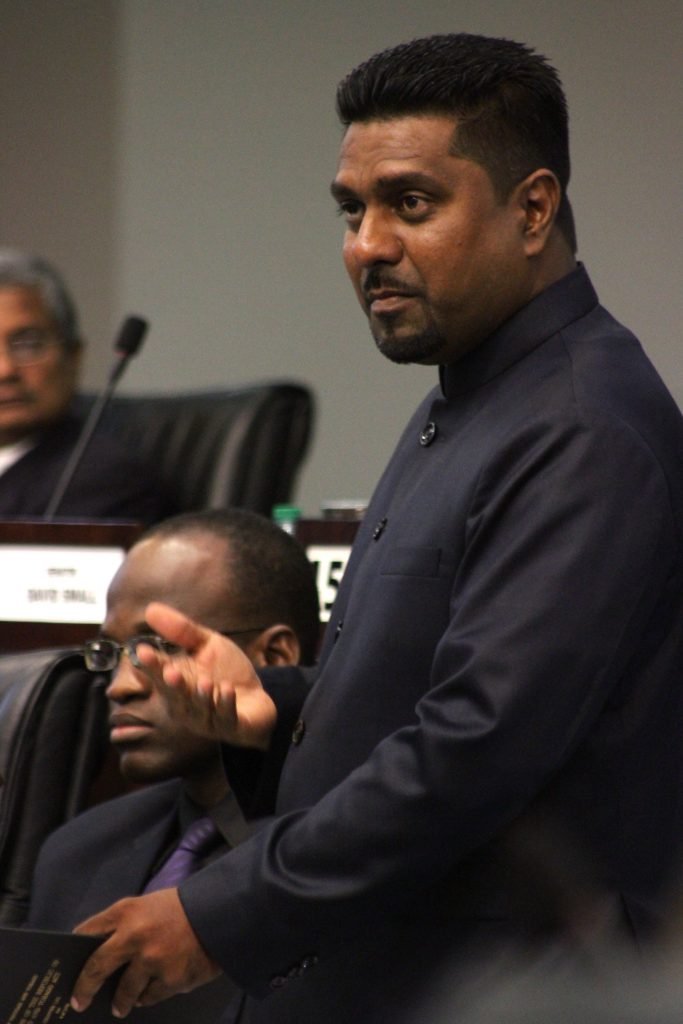Fighting back crime

PROF RAMESH DEOSARAN
Fight. This is described as “to engage in battle; campaign determinedly to achieve something; a vigorous effort in the face of difficulty.”(Concise Oxford) This is exactly what we need to push back crime and violence. We have to engage the enemy with determination and vigour but strategically. That is what I thought should help way back in 1977 – 30 years ago.
I became, as President Paula-Mae Weekes advised last Monday, “a man with a plan” – a National Crime Commission - hoping to achieve something in the face of national difficulty. (Sunday Express, July 21, Nov. 20, 1977) It might not have produced 100% solutions, but it would have brought us much closer. I admit some immodesty here, but how else can I advise my fellow citizens that the longer we take to build a strategically-developed, depoliticised, national consensus on the crime-fighting essentials, so long will the roots go deeper and resistant.
The 1977 proposal to government for a multi-sectoral, strongly representative National Crime Commission (NCC) was designed to bring the population more fully into the crime fighting apparatus in structured, consensus-building ways. In any case, so much has happened since 1977, that one may ask “of what use is a National Crime Commission now?”
Last week’s anti-crime remarks by Senators Gerard Ramdeen, David Small and Khadija Ameen were quite noteworthy, especially in the context of the Police Manpower Audit report now before their parliament with some 100 recommendations to improve police performance, integrity and public confidence. Senator Ramdeen rightly said: “Far too long we have wrestled against a tide (of crime) that has caused too many of our citizens to retreat.”
He added that if law enforcement “did not have the will, courage and commitment,” the country would get nowhere with legislation. The police should have tasers, advised Senator Small. That, and more, is exactly what the Police Audit team recommended. The police audit further recommended improved technology to the police for fighting cyber-crime and rooting out police corruption. Senator Ameen asked the government: “What steps have you taken to deal with corruption in the TT Police Service?” As promised, I now insert the second part of last week’s column:
“On September 7, 1977, Police Commissioner Tony May warned the country about his fears concerning a new possibility- kidnapping. John Donaldson’s home in Point Cumana was reportedly broken into. Just last week a gun and 10 rounds of ammunition were reportedly stolen from Labour Minister Desmond Cartey, who insists in keeping the Prisons Report locked up.
“Within the last year, incidents involving Government officials have curiously increased. The thing is creeping in, heading into the more bizarre, the more dramatic. “Freedom fighters” were shooting from the bushes.The hero worship of Randolph Burroughs begs the question. Imagine a senior police official recently telling citizens of this country that they ought to hire security guards to protect their homes. Some broad, primary areas for study by the National Crime Commission are: 1. Should capital punishment be abolished? 2. Where and why has there been a significant increase in crime over the last ten years? 3. What are the underlying motives of the “bush gangsters?” 4.How could control, security, intervention, prediction and rehabilitative procedures be improved? 5. International or regional traffic and local crime. 6. How could voluntary organisations and the community be continuously absorbed into the attempt to keep down crime and violence? 7. Are there any predominant characteristics (socio-economic or psychological) common to particular groups of criminals?
“Maybe we need in 1977 , to legitimize our penal code , let the public understand the philosophy of punishment , and let us all see relationships between crime and social order. The National Crime Commission could therefore be positioned to research and recommend on the sane, the insane, and on the policy of capital punishment.
“Some Secondary areas for study: 1.The psychological impact of violence and certain forms of advertising on television. 2. Review the role of social control systems such as schools in promoting “a culture against crime” and accentuating the humanistic dimension of the person.
“The mild controversy in Trinidad over TV violence as providing a cathartic experience or a learning effect (through motivation) has not yet taken into account that under peculiar conditions , one effect becomes predominant over the other. Our children are not necessarily like the American or British. Even so we have different groups of children. Let us get some guidance from the National Crime Commission to study the relationship between TV, child development , and adult violence in Trinidad and Tobago.
“The Commission’s functions would therefore be: Research, Public Inquiry, Policy Recommendations. It is indeed a distressing sign of the times to hear Senior Superintendent Gordon Waterman reporting on 29 unsolved murders and the reluctance of the public to offer information. A National Crime Commission, with some understanding of attitude change and public mobilization, will really break down this public resistance. To help the Crime Commission operate as proficient yet a democratic link between the governors and the governed, representatives could be drawn from: parliament, business, academic and research community, church, voluntary organizations, protective services.
“A Crime Commission as a permanent well-resourced agency would therefore continuously feed its findings into policy-making areas. In this sense, the Commission would not be a limited frenzied reaction to today’s crime wave, but would become an integral part of social planning machinery of the State. It is long overdue. But it is not yet too late.”

Comments
"Fighting back crime"